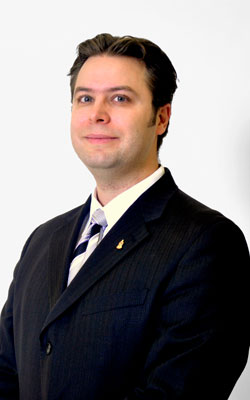
Professional judgment
Examining how auditors, accountants and professional committees make decisions
Regan Schmidt is an Associate Professor of Accounting whose research focuses on accounting professionals’ judgment and decision making using experimental methods. Schmidt currently serves as an Associate Editor for Issues in Accounting Education and serves on Editorial Boards for Behavioral Research in Accounting, Accounting Education, and Accounting Perspectives.
Research Context
Schmidt’s research involves trying to “understand, explain, predict, and ultimately improve how accounting professionals make judgments and decisions.” He broadly defines accounting professionals as auditors, financial statement preparers, financial statement users, tax professionals, and other professional accountants (for example, accountants serving on professional committees). His research primarily uses experimental methods to examine and extend psychology theories in the accounting institutional context.
The Big Research Questions
Schmidt’s big research questions are “how can audit quality be improved?” and “how do professions manage their members?”
He explains how psychology theories underlie these research questions: “Professional judgment is fundamental to audits of financial statements. Throughout the auditing process, auditors make complex judgments that impact subsequent stages of the audit and ultimately determine the audit report. By examining these judgments, it is possible to ascertain where and why in the auditing process auditor judgment deficiencies arise and how to structure training and/or decision aids to alleviate these judgment deficiencies. Ultimately, this improves financial statement audit quality which benefits society because financial statement users such as investors rely upon the audit report. In regard to my second big question, I’m curious how the profession responds and deals with instances where accountants fail to execute sound professional judgment to the extent that it is deemed professional misconduct. There’s judgment, or the lack thereof, as to why an accountant committed misconduct in the first place. There is also judgment executed by the accounting profession’s discipline committees on how to manage the offending accountant. Specifically, deciding whether a professional colleague is guilty of failing to adhere to the standards of the profession, and if so, how to administer discipline are both difficult decisions underscoring the need for research. Improving discipline committee members’ judgment and decision making enables professions to manage its members more effectively and most importantly protect the public interest.”
Motivation for Engaging in Accounting Research
For Schmidt, his research interests and questions around professional judgment developed out of practical experiences as an auditor. Schmidt is an alumnus from the U of S, Edwards School of Business Master of Professional Accounting (MPAcc) program and a Chartered Professional Accountant (CPA, CA). “I worked with a public accounting firm for years before I ultimately decided to go back to do a PhD. It was a unique time in public practice because integrated audits were being implemented for the first time in response to the Sarbanes-Oxley Act of 2002. While practicing public accounting, I saw issues that didn’t have concrete answers and I realized that academic research was best suited to provide the answers.”
According to Schmidt, the MPAcc program made him realize the importance and usefulness of research. “Without being exposed to academic research in the MPAcc program, I’m not sure if I would have made this realization when I was in public practice.”
Commenting on the role of accounting research, Schmidt said, “Accounting and auditing practices are continually evolving. As it does, knowledge must also advance to understand and guide the new practices. It’s your own curiosity for new knowledge that drives your research forward. The challenge with accounting and auditing research is that the researcher needs to know two bodies of knowledge. First, we need to understand the accounting institutional context to be able to ask interesting research questions that practice is concerned about. Second, accounting researchers leverage a base discipline, in my case psychology, to provide answers to those research questions. Personally, I like discussing my research findings and potential research questions with practicing accountants to assess whether my research addresses the issues they are dealing with. If they are curious to know the answer, I know I’m on the right track.”
Findings from Recent Research and Subsequent Work
As an example of Schmidt’s research, and in regard to his second “big question” on how professions manage their members, a recent FT-50 publication by Schmidt illustrates how the accounting profession’s discipline committees sanction accountants guilty of professional misconduct. Co-authored with Dr. Devan Mescall and Dr. Fred Phillips who are fellow Edwards School of Business Department of Accounting professors, this study questioned whether the profession’s disciplinary practices changed when the accounting profession experienced increased public scrutiny – namely when the Canadian Public Accountability Board (CPAB) was established.
Schmidt said, “We were curious how the accounting profession’s discipline committees sanction decisions changed from pre- to post-public scrutiny. That is, when addressing a professional accountant found guilty of professional misconduct for having failed to adhere to the standards of the profession, did the establishment of an auditing regulator (i.e., CPAB) increase or decrease the sanctions administered by the profession’s discipline committees? Based on theory, we predicted that discipline committees would be more severe with their punitive sanctions in periods of greater public scrutiny – that is, after the establishment of the CPAB. The theory suggests this occurs because under increased public scrutiny, the profession is striving to illustrate that it is able to manage its own members without external interference which is a hallmark of self-regulatory professions.”
The data for the study was obtained by codifying 403 discipline cases that were published by the Institute of Chartered Accountants of Ontario (now CPA Ontario) over a 30 year period. Schmidt and his collaborators found that punitive sanctions (e.g., suspensions) were greater in the post-CPAB period versus the pre-CPAB period consistent with the theory. Furthermore, other sanctions such as rehabilitation (e.g., assigning continuing professional development courses) and monitoring (e.g., supervising the offender’s subsequent work) were also found to be greater in the period of increased public scrutiny. However, external reporting (e.g., newspaper publication) of these professional misconduct instances did not change between pre- versus post-scrutiny periods.
Based on these findings, Schmidt and Mescall developed a subsequent study focusing on auditor professional discipline. The working paper is the first to provide insight into the auditor misconduct incidents, behavior and rationalizations of auditor defendants during the discipline proceedings, and the professional judgment exercised by the discipline committees when ascertaining guilt and sanctions. To provide a foundation for future research, the study develops a conceptual model of auditor professional discipline supplemented with propositions and testable hypotheses. Using the conceptual model, Schmidt and Mescall have commenced empirical work testing the associations advanced by the model.
Research Impact on People in Society
Schmidt’s research is relevant to society at large. According to Schmidt, “the reason this research matters is because professional discipline is structured and operates differently across jurisdictions. For example, accounting professional discipline in Canada occurs at the provincial level whereas in Australia it occurs at the national level. As another example, the extent of public representation in the discipline process differs, surprisingly even across Canadian provinces. Given the variance of discipline committee practices in the accounting profession, research is well suited to discover best practices. This stream of research is poised to shed light on how professions are able to manage their members more effectively and therefore protect society and the public interest.”
He continued, stating, “As a case in point, consider corporate governance mechanisms such as audit committees. Prior to the establishment of National Instrument 52-110 in Canada, academic research had provided insights into best practice recommendations for audit committees. I am hopeful the same can be said for this new stream of research on discipline committees.”
Schmidt’s research addresses concerns of social importance. “Accounting and auditing research is a social science that aims to improve society. In regard to my research interests, whether it is improving the quality of audits or improving how professions manage their members, societal benefits of this basic research occur at the local, national and international level,” he said.
Exciting Research Collaborations
Regan Schmidt collaborates with public accounting firms and accounting professionals to improve accounting practices. These professional collaborations have contributed to advances in the fields of auditing, financial reporting and taxation.
According to Schmidt, “The most important collaborations is with the profession itself.” He emphasized that without collaborations with fellow professional colleagues that generously volunteer their time, it would be impossible to collect data to answer some of these research questions. “Professional judgment and decision making research requires professionals. A professional’s time is precious. I am thankful that colleagues in the accounting profession see the benefit of this research and continues to support it by providing their valuable time to complete questionnaires, which serves as the primary data source for my research. Without their generosity, my research would not be possible.”
Within scholarship, he is engaging in numerous other research collaborations. One such collaboration with Dr. Devan Mescall examines issues that can arise when a public accounting firm provides both financial statement audit and tax advice services. Another collaboration with Dr. Gary Entwistle and Dr. Hamilton Elkins examines how subjective information disclosed in the notes of the audited financial statements, enabled under IAS 1, impacts nonprofessional investors’ judgment and decision making.
Schmidt concluded by highlighted another avenue for research collaborations. The Edwards School of Business Department of Accounting maintains an Honours Program for undergraduate students in their final year of studies interested in accounting research. Schmidt regularly works with Honours students on research projects and found these collaborations with students to be highly beneficial. “A research project is jointly created that both the student and supervising faculty member are excited about. This provides the Honours student with a unique opportunity to experience discovery research, which changes and enriches how they envision their future profession. Exceptional projects and students gain exposure to the challenge of publishing a manuscript by undergoing the peer review process after their Honours project is completed.” As an example of such a collaboration, Schmidt’s past Honours student, Britney Bergermann (née Cross), successfully published her Honours project that examines how auditor rotation impacts client management’s financial reporting negotiation strategies.
Professor Schmidt gratefully acknowledges the research support provided by the Edwards Research Scholar.
To learn more about Dr. Regan Schmidt’s work, check out his Profile Page!
ILLUSTRATIVE PUBLICATIONS
MacTavish, C., S. McCracken, and R.N. Schmidt. 2018. External auditors' judgment and decision making: An audit process task analysis. Accounting Perspectives, 17 (3): 387-426.
Mescall, D., F. Phillips, and R.N. Schmidt. 2017. Does the accounting profession discipline its members differently after public scrutiny? Journal of Business Ethics, 142 (2): 285-309.
Schmidt, R.N. 2014. The effects of auditors’ accessibility to “tone at the top” knowledge on audit judgments. Behavioral Research in Accounting 26 (2): 73-96.
Schmidt, R.N., and B.E. Cross. 2014. The effects of auditor rotation on client management’s negotiation strategies. Managerial Auditing Journal 29 (2): 110-130.
Salterio, S.E., J.E.D. Conrod, and R.N. Schmidt. 2013. Canadian evidence of adherence to “comply or explain” corporate governance codes: An international comparison. Accounting Perspectives 12 (1): 23-51.
